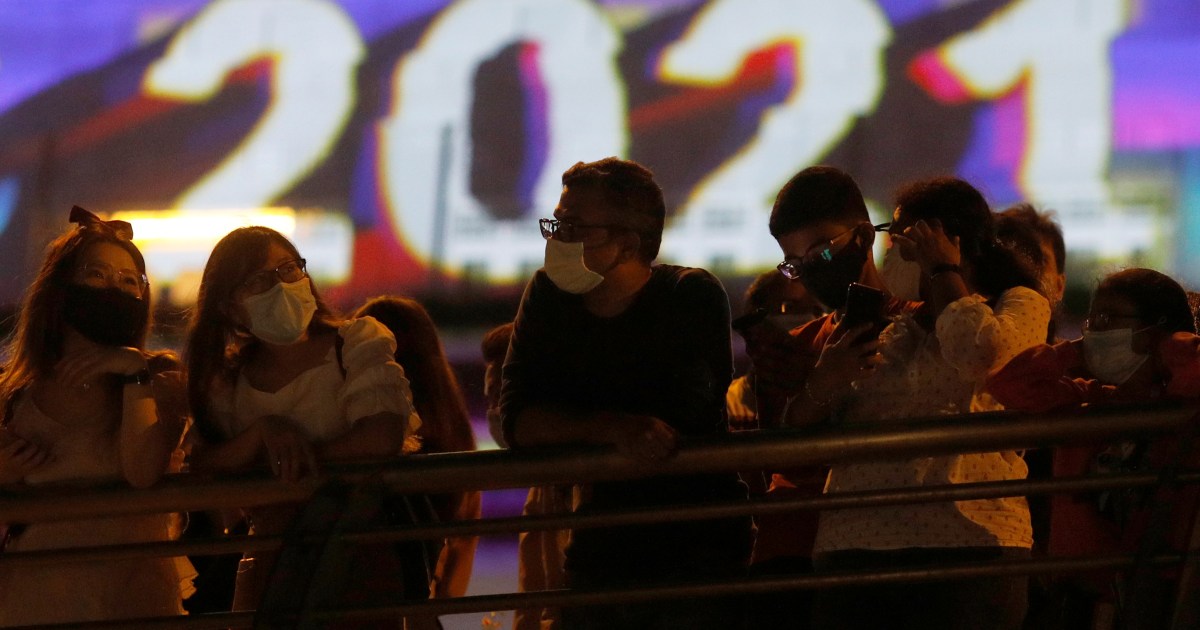The countries of the world began to receive the new year Thursday, in light of restrictions to limit the spread of the new Corona virus, relaxing their weight on the celebrations of billions of people eager to bid farewell to the year 2020 that the pandemic has marked.
After a difficult year in which at least 1.7 million people died of the Covid-19 epidemic, new mutations have caused the re-imposition of isolation measures, and forced night-time lovers to continue a habit they made in 2020, which is to follow activities from home.
The highly anticipated early hours of 2021 in the countries of Kiribati and Samoa in the Pacific Ocean are at ten o'clock GMT, while the uninhabited islands of Howland and Baker will be the last areas to receive the new year 26 hours later.
An hour later, New Zealand, which won international acclaim for its handling of the Corona virus, followed, and large crowds gathered in Auckland to watch a fireworks display.
Although the Pacific Islands remain untouched by the worst fallout from the epidemic, border restrictions, curfews, isolation measures and closures make New Year's Eve different this year.
In Sydney, the largest Australian city, light shows lit the harbor with a dazzling display at 13:00 GMT, but few people attended the event.
Plans to allow crowds to gather were canceled after a focus of around 150 new infections was recorded, leading to severe restrictions on travel to and from Sydney.
Karen Roberts was among the few people allowed to cross the checkpoints set up around the area.
"I think everyone is looking forward to 2021 as a new beginning and a new beginning," she told AFP in a bar overlooking the Sydney Opera House.
In Italy, where the horrific images of makeshift morgues and exhausted paramedics have awakened the world to the severity of the crisis, the country is subject to general lockdown measures until January 7 with a curfew beginning at 10 pm.
From France to Latvia and Brazil, police and sometimes military personnel are deployed to ensure that the curfew or ban on gatherings is observed in large numbers.
In worst-damaged London, American singer-songwriter Patty Smith, 74, will mark the New Year by honoring the National Health Service workers who have perished from the Covid-19 epidemic, in a screening in Piccadilly Square and by streaming on YouTube.
Social encounters
In Dubai, thousands of residents are expected to watch a display of fireworks and lasers at the Burj Khalifa, the tallest tower in the world, despite new cases of the virus.
All attendees, whether in public areas or in hotels or restaurants, will be required to wear masks and register via a bar code (QR).
In Beirut, which is still trying to overcome the disaster of the port explosion on August 4, the authorities have also relaxed the procedures, so the curfew was delayed to 3 am, and bars, restaurants and nightclubs reopened with the announcement of large parties to mark the New Year.
Pictures and videos of crowded clubs and restaurants are spreading on social media, prompting the authorities to warn of the possibility of imposing new closures after the holidays.
On the shores of Lake Baikal in Siberia, where temperatures reach -35 degrees Celsius, about a dozen Russians participated in an ice dive on New Year's Eve.
Swimmers, known in Russia as the "seashell", ran several kilometers through a snowy forest in swimsuits and festive costumes before diving into the world's largest freshwater lake.
And in Brazil, which has recorded more than 193,000 deaths from Covid-19, making it the second most affected country by the epidemic in the world, frightened medical teams are waiting for a new wave.
In recent days, social media platforms have been filled with videos showing people without masks or masks enjoying an evening out, and TV channels have shown scenes of police officers closing bars full of people.
"The epidemic reached its peak between May and July, when there were not many movements and we took more care of ourselves. Now there are a lot of cases and people are behaving as if there was no pandemic," said University of Sao Paulo microbiologist Luiz Gustavo de Almeida. .

